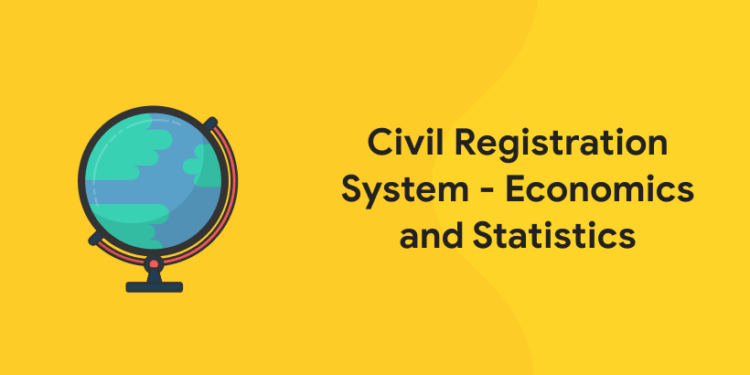Table of Contents
Civil Registration System (CRS), also known as birth and death registration system, is the recording of important events like Birth, Death & Still Birth under the statutory provisions on continuous and permanent basis. CRS comes under the Concurrent list of the Constitution of India at Sl. No. 30.
Civil registration (CR) is the recording of important events in a person’s life (e.g., birth, death) and is a fundamental function of the national government. Birth registration set ups a person’s legal identity at birth. Having a legal identity, name, nationality, proof of age, and the related are vital human rights and facilitates individuals to implement their rights (e.g., to vote) and enjoy different government, social, and private services. Vital statistics (VS) are statistics on these important events and of the persons concerned. The accessibility of valid and timely VS depends on the level of development of CR. Having an effective CRVS system is essential for planning and observing programs across many sectors. Yet, over 110 low- and middle-income countries have poor CRVS systems. This course offers practical tools and approaches to attaining 21st century state-of-the-art CRVS systems that are connected to identity management systems and modified to local circumstances. This self-paced format is provided for busy professionals who are able to take the course at their own speed and finish at any time. Learners will get a Basic Level Certificate after successfully finishing Core Modules 1-3 and can eventually enroll in the Facilitated format to get an Advanced Level Certificate.
Practise free mock test and ace your government exams! Download Entri App!
What are civil registration and vital statistics (CRVS) systems?
In most countries, a civil registration system is used to record statistics on vital events, such as births, deaths, marriages, divorces and fetal deaths. This government administrative system generates a permanent record of each event. A well-functioning CRVS system objects to:
-
- protect individuals with recognition of their legal identity and assure rights of access to public services, social protection and human rights;
- create statistics on population dynamics and health indicators on a regular basis for the country as a whole and at a local level for its administrative subdivisions;
- create required statistical data that decision-makers depend on for policy formulation, planning and execution, and observing, and
- allows the understanding of the prevalence, distribution and causes of mortality, as well as identify health inequalities and priorities.
Grab Latest Study Materials! Register Here!
Civil registration is defined by the UN as: “the continuous, permanent, compulsory, and universal recording of the occurrence and characteristics of vital events (live births, deaths, fetal deaths, marriages, and divorces) and other civil status events pertaining to the population as provided by decree, law or regulation, in accordance with the legal requirements in each country.”
Development and enhancing of CRVS systems are important for strengthening the quality of a country’s vital statistics, and for using this information to help policies and programmes. This wider concept has been apprehended in the UN definition of a vital statistics system as: the total process of: 1) accumulating information by civil registration or computation on the frequency or occurrence of specified and defined vital events, as well as relevant characteristics of the events themselves and the person or persons related; and 2) assembling, processing, evaluating, assessing, presenting and disseminating these information in statistical form.
Practise free mock test and ace your government exams! Download Entri App!













